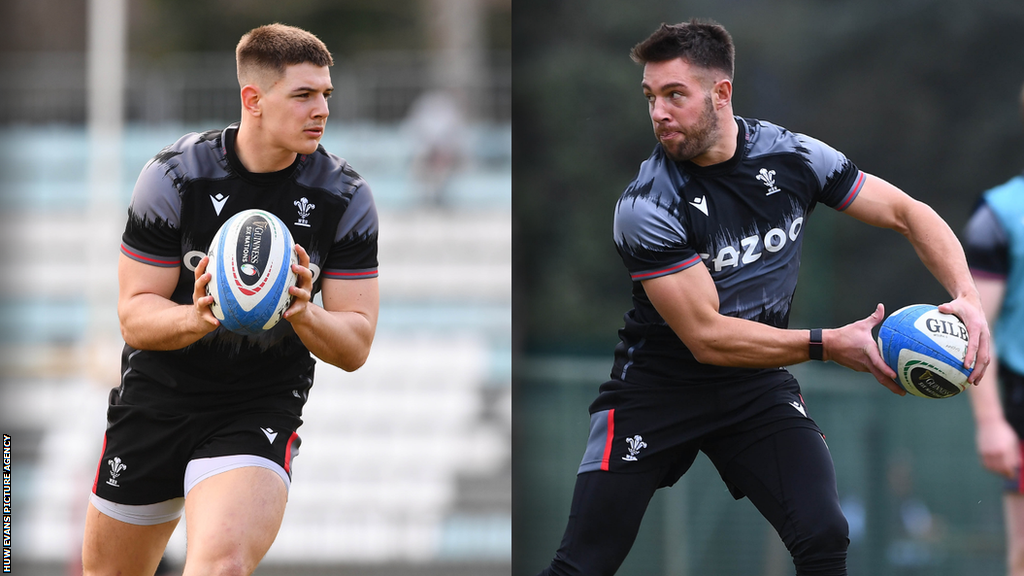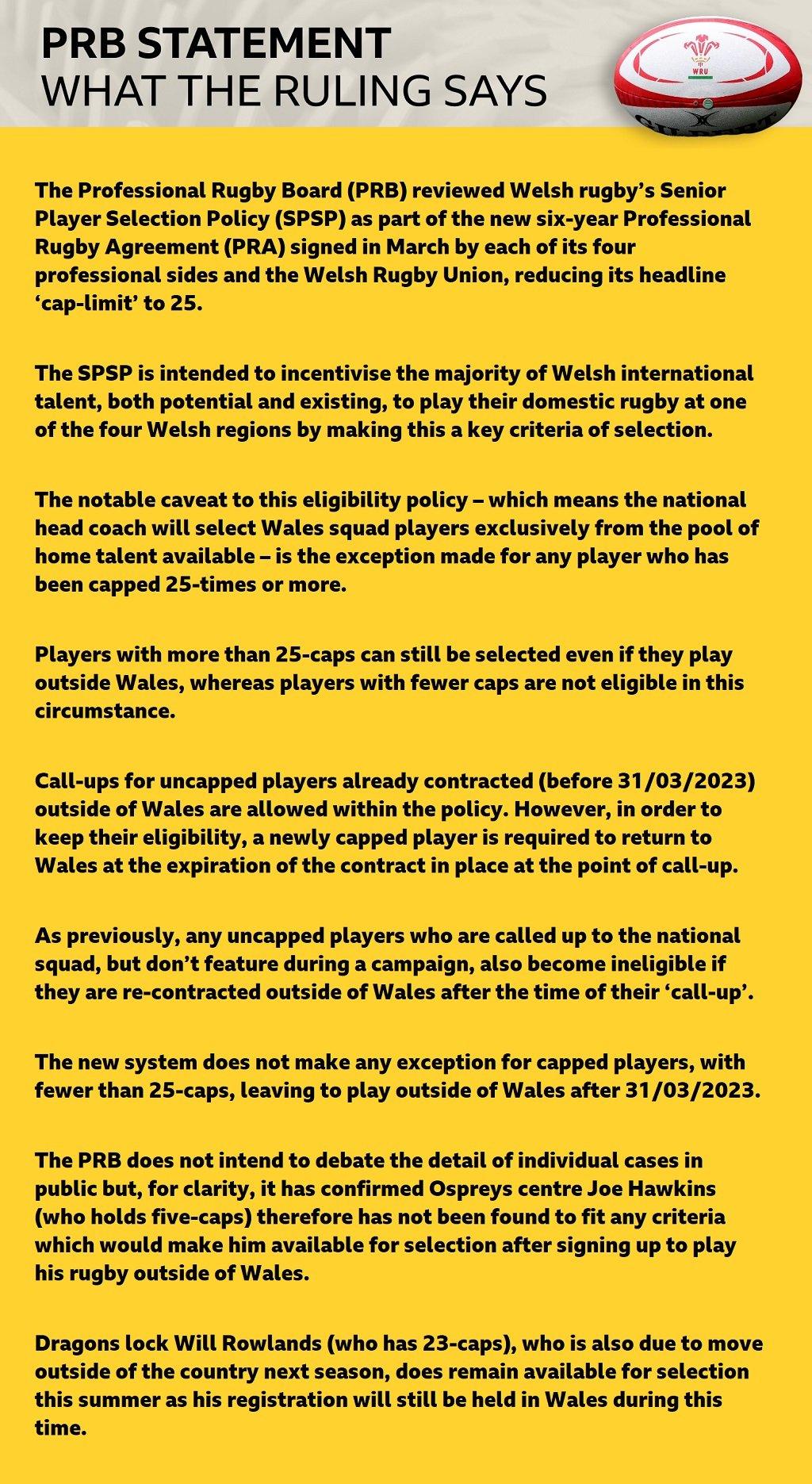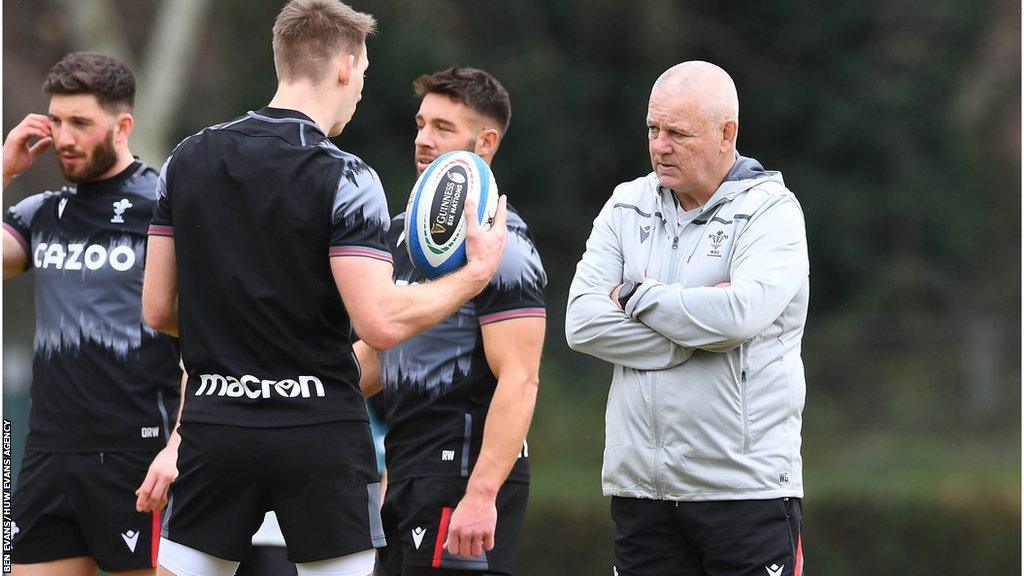Welsh Rugby: Are Wales' eligibility rules fit for purpose?
- Published

Joe Hawkins and previously Rhys Webb have both been deemed ineligible to play for Wales
For Rhys Webb in 2017, now read Joe Hawkins in 2023. A player leaving the Ospreys and no longer available to play for Wales.
Wales' international eligibility rules continue to baffle many about who can and cannot play international rugby for this small country.
As Warren Gatland named his 54-man preliminary squad for the World Cup in France later this year, another confusing conundrum emerged.
A 20-year-old in Swansea-born Hawkins cannot play for Wales at a World Cup as he has joined Exeter.
A player who has come through the age grade system, captained the Wales Under-20s side and featured in five internationals.
Then, on the other hand, you have Kingston-upon-Thames born Henry Thomas who has previously played seven internationals for England between 2013 and 2014 after coming through the English system and plays his club rugby in France for Montpellier.
Thomas qualifies through his father who hails from Swansea and is eligible under World Rugby regulations because he played for England more than three years ago.
The 31-year-old would become the first men's international to represent both England and Wales senior sides in rugby union, with Carys Williams-Morris achieving that accolade for the Wales women's team in 2022.
Rugby World Cup 2023: Uncapped Wales prop Henry Thomas can add 'something different'
Uncapped element
So how has that happened? Hawkins not being able to play for Wales, while Thomas can.
Those playing outside of Wales are now required to have 25 caps to represent their country after the number was dropped from 60 in February 2023.
Hawkins falls foul because he only has five caps when he made his move, while Thomas is eligible because he is uncapped in Wales' eyes which makes him exempt from the regulations.
Compare also the case of Hawkins with Max Llewellyn, another young Welsh centre who is leaving to join an English side next season.
In Llewellyn's case it is Gloucester, but unlike Hawkins, he remains eligible to play for Wales and has been named by Gatland.
This is because Llewellyn is uncapped. Because he has not been handed a first international appearance or been involved in a national training squad, he can still be selected even though he is also crossing over to English club rugby.
Llewellyn missed the Six Nations campaign through injury but had he been picked by Gatland for that campaign, he would not have been eligible now.
Then there is the case of Dragons lock Will Rowlands, who is leaving Wales to join Racing 92 next season.
Rowlands was Wales' player of the year in 2022 and his physicality was missed during the recent Six Nations tournament because he was unavailable with a shoulder injury.
He has currently won 23 caps so is two short of the threshold needed to be able to leave Welsh rugby and still be available for the national side.
The Professional Rugby Board (PRB) have decided Rowlands remains eligible to play for Wales because they say his registration is being kept in Welsh rugby over the summer. What that looks like they have not elaborated on.
Wales have three World Cup warm-up games in August where Rowlands could make it up to the threshold required.
There are other confusing results that could be cited.

Will Rowlands was a Wasps player when he made his Wales debut prior to joining Dragons in 2021
Why have the policy?
The cap rule was brought in during 2017 in a bid to keep the top players at the four regions and let the Wales head coach have more preparation time with the national squad.
The number was initially set at 60 and captured a high-profile casualty in Webb, who left Ospreys for Toulon without having the requisite number of internationals under his belt. Webb has since become available.
The policy appeared to work with some top talent returning to Wales, although the fortunes of the struggling regions never really changed.
The amount of caps has come under scrutiny over the last year because of the decreasing amount of money and reduced contracts being offered.
With Welsh players threatening to strike for the Six Nations match against England in February 2023, one of the bargaining tools of the players was to have the number of internationals played reduced.
The PRB agreed and it was announced the number would go down by 35 to its new number. So Hawkins has become the first major test case because he officially signed for Exeter from Ospreys in April.
His international debut came against Australia in November 2022 before he started the first four matches of the Six Nations campaign.
The PRB have ruled because he is leaving Wales and has played five caps he can no longer play international rugby.
The official line
The PRB, who run the professional game in Wales with representatives from the Welsh Rugby Union (WRU) and four regions, decide the eligibility rules.

What's the Wales shirt worth now?
Those who set these rules believe they are simple to follow.
The regions want it maintained because they do not want to see an exodus of top talent leaving Wales, while Gatland wants maximum time with his squad and players with those plying their trade in England and France not allowed to meet up in the national camp as often as their Welsh counterparts.
Its detractors want the policy scrapped as they argue it's limiting the pool talent Wales can pick from and punishing players who choose to leave the financial-strapped Welsh game to maximise revenue in a short career.
Along the way the rules have resulted in contrasting unforeseen situations like the Hawkins and Thomas scenario.
The modern day economics of Welsh rugby is making it harder to keep players in Wales but other nations are also battling this problem, most recently England.

Warren Gatland returned to Wales for a second spell as head coach in December 2022
Gatland was asked whether Hawkins' move and subsequent ineligibility verdict shows the hallowed national red shirt is not enough to keep players in the country.
"Yeah absolutely, I've made that point and we're not a reflection of where Welsh rugby has been at for a number of years," said Gatland.
"We've got to hopefully put things right and there is an opportunity now. The regions have got to deal with the Union and put plans in place in terms of moving forward.
"There are a number of issues in terms of age group stuff, that development and working the academies is important.
"These issues have been here before and we were probably blocking up the dam in terms of them not coming to the fore because of success we had.
"The onus is on all of us, as a national team and regions to be more successful, so we retain our players and they want to be part of teams here."
How Welsh rugby arrives at that point now in the current climate remains to be seen.